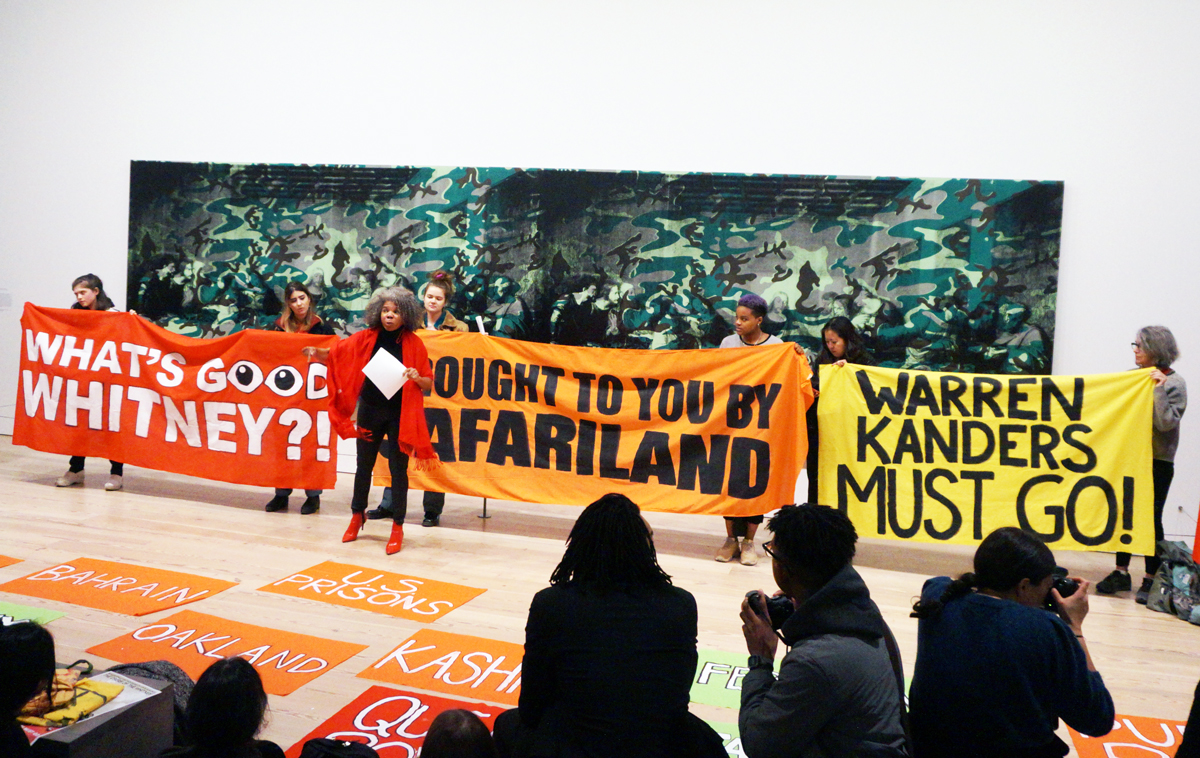[ad_1]
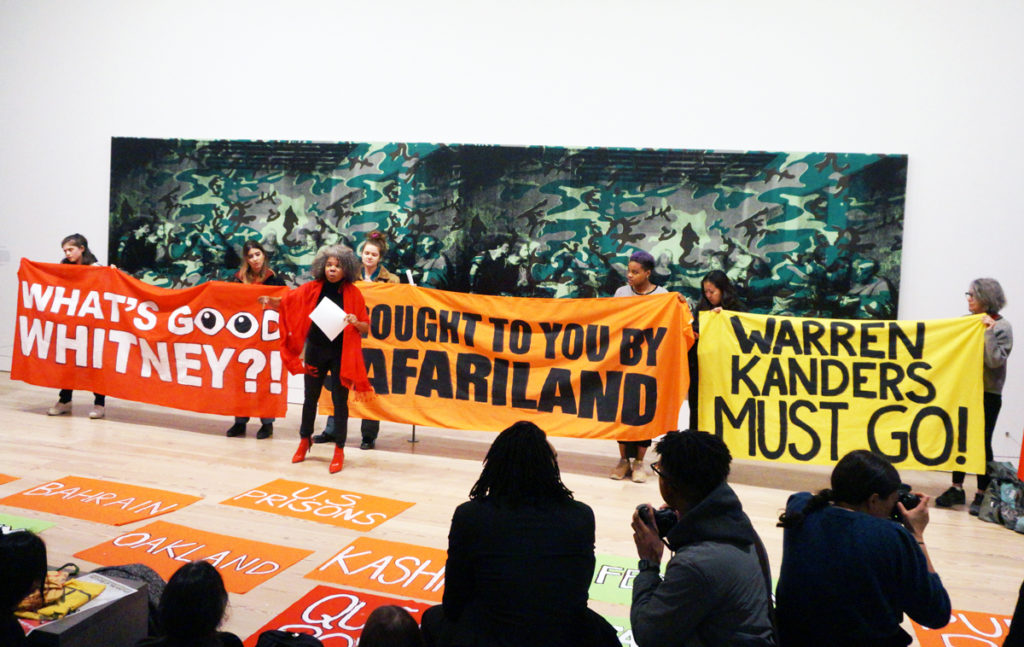
A protest held by Decolonize This Place held at the Whitney Museum on March 22, 2019. Speaking here is Alicia Boyd, of the group Movement to Protect the People.
KATHERINE MCMAHON
On Friday evening, the activist group Decolonize This Place kicked off its “Nine Weeks of Art and Action,” a weekly series of protest-minded events at the Whitney Museum in New York, inside the institution’s blockbuster Andy Warhol exhibition. It was the second time that the group had protested at the Whitney, and like that first action, the night’s event was aimed at getting Warren B. Kanders removed from his position as vice chairman of the museum’s board because of his ownership of a company that makes tear-gas canisters that have been used against asylum seekers along the U.S.-Mexico border.
“We are doing our best today to not cause problems for the staff, but we want to cause problems for Adam Weinberg,” who is the museum’s director, “and his homey Warren Kanders,” artist Shellyne Rodriguez, a longtime Decolonize This Place collaborator, told the crowd inside the Warhol show, flanked by protestors holding various banners. She added, “This motherfucker has got to go!”
In front of Rodriguez, on the gallery’s floor, were a number of small banners with the names of places that have been sites of protests about racism and colonialism—Kashmir, Ferguson, Tijuana, Palestine, Standing Rock, and many more.
As with that previous action, Decolonize This Place’s protest sought to tie Kanders and his ownership of Safariland, a defense manufacturing company, to histories of colonialism, gentrification, and the oppression of queer communities, and to relate it to other controversies that museums across the world are now facing.
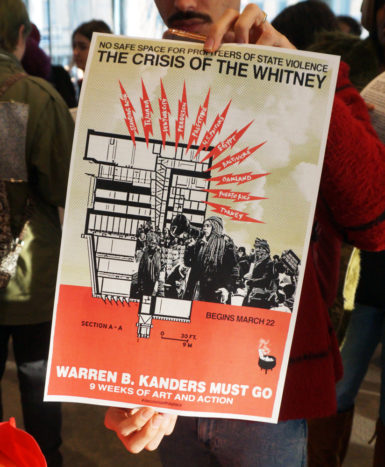
A protestor holding a poster distributed by Decolonize This Place.
KATHERINE MCMAHON
The claims against Kanders are derived from a report in 2018 that laid bare his ownership of Safariland, a company headquartered in Jacksonville, Florida. Tear-gas canisters made by Safariland have been used against asylum seekers on the border, and the company’s gun holsters and ballistic equipment have also been utilized by the New York Police Department.
Following the report, nearly 100 employees at the Whitney Museum circulated a letter in which they called on the museum’s management to consider having Kanders resign from his position at the Whitney. Weinberg responded by calling on Whitney staff to start a conversation about the issue, and Kanders issued a statement saying that he was “not the problem.” A Decolonize This Place action followed in December at the museum, as well as a town hall in January at Cooper Union.
Reached by ARTnews, a spokesperson for the Whitney declined to comment on the protest.
[Read a complete timeline of the Kanders controversy.]
Since its first Whitney action, Decolonize This Place has teamed up with some 30 activist organizations, many of which were represented at Friday night’s event. Among them are P.A.I.N., a group founded by photographer Nan Goldin that aims to raise awareness of the Sackler family’s role in arts funding, as well as Art Space Sanctuary, Chinatown Art Brigade, and the People’s Cultural Plan.
At the start of the event, the action’s attendees occupied a gallery on the fifth floor of the Whitney that is home to part of the Warhol retrospective, which has been supported by Kanders. They stood in front of Warhol’s 25-foot-long painting Camouflage Last Supper (1986) and held up banners that read “BROUGHT TO YOU BY SAFARILAND,” “SAFARILAND SUPPLIES THE NYPD,” and “WARREN KANDERS MUST GO!,” among other phrases. Hung nearby the protestors was a Warhol screenprint of a handgun.
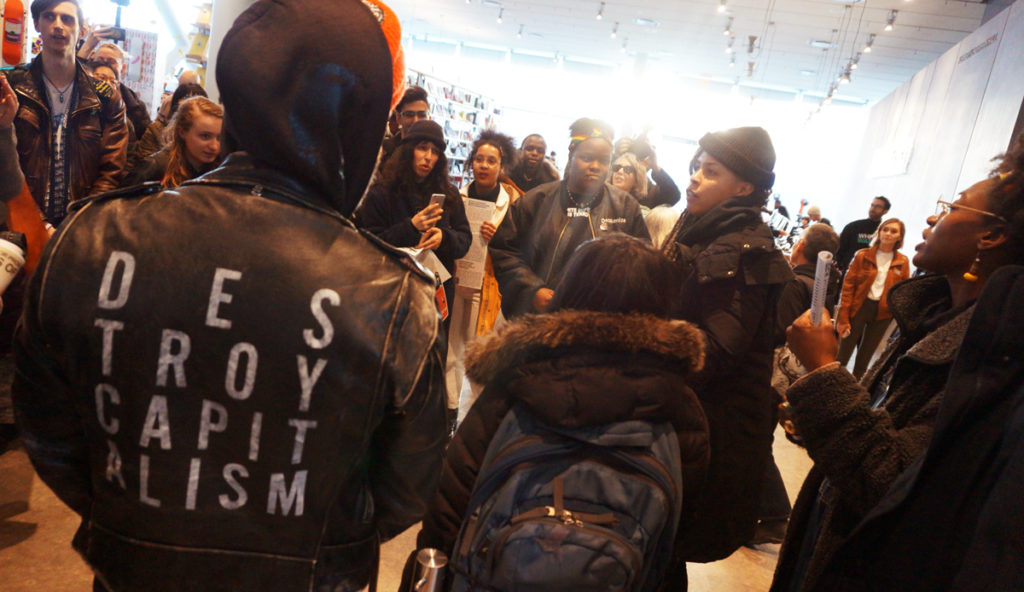
Protestors meeting in the Whitney’s lobby.
KATHERINE MCMAHON
After an acknowledgement that the protest was going to take place on Lenape land, members of various activist groups were invited to speak. Some of these organizations were arts-related; some were not. Some speakers specifically focused on Kanders; some barely mentioned him. Their comments were met with shouts and foot stamping from protestors.
As the evening’s proceedings began, word spread that the Guggenheim Museum had announced it would not accept donations from Sackler family members, some of whom have been accused of fueling the opioid crisis through sales of OxyContin via Purdue Pharma. This made P.A.I.N.’s presence at the protest something of an event unto itself, even if Goldin herself wasn’t present. “Direct actions work,” Megan Kapler, a member of P.A.I.N. said with a smile. She later told a rapt crowd: “We don’t want dirty money. We want transparency. We want accountability.”
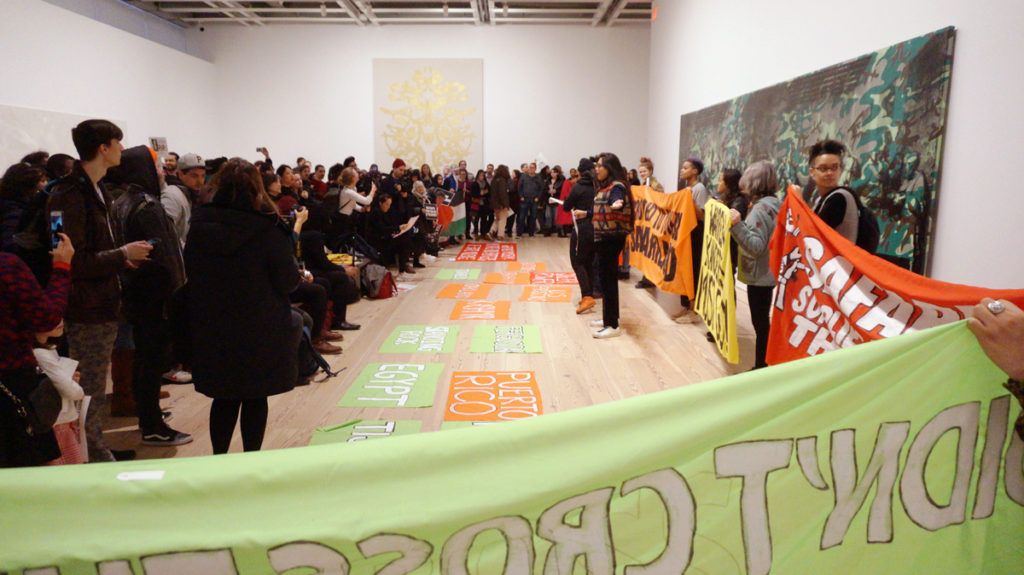
Decolonize This Place’s protest in the Whitney’s galleries.
KATHERINE MCMAHON
Many speakers offered similarly pointed remarks at the peaceful protest. Abou Farman, whose group Art Space Sanctuary is now leading a campaign against Museum of Modern Art and MoMA trustee Larry Fink for allegedly profiting off private prisons in the U.S., said, “Kanders, have you ever felt tear gas? Has your family? Have you ever been in a detention center?”
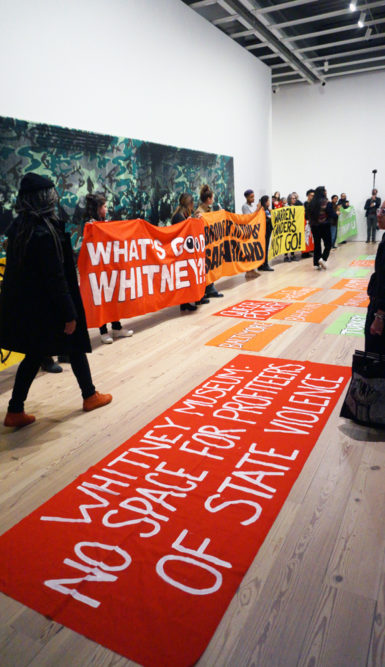
Decolonize This Place’s protest in the Whitney’s galleries.
KATHERINE MCMAHON
“Safariland is maiming us,” Betty Yu, a member of Chinatown Art Brigade, said. In one of the protest’s most impassioned moments, she repeatedly yelled “Whitney Museum,” to which the crowd answered, “Shame on you!”
Eventually, the protest moved downstairs, to the entrance to the Whitney, where patrons waiting to get into pay-what-you-wish hours at the museum were forced to relocate temporarily. A group photo was taken, and short phrases were chanted. In something equivalent to a closing-credits sequence, the names of all the Decolonize This Place–allied groups were projected onto the Whitney’s facade.
The question now is: In what ways will activism continue in the run-up to the Whitney Biennial? In a letter released in January, ahead of the exhibition’s artist list being revealed, the activist collective W.A.G.E. called on participants to “demand to be paid for the content they provide and withhold that content until the demands of Whitney staff are met.” (The New York Times reported in February that each participant would receive a $1,500 sum.) And Forensic Architecture, one of the 2019 biennial’s participants, has said it will respond to the Kanders controversy, but has declined to provide details.
Now there is the “Nine Weeks” series, in which Decolonize This Place, working with 30 other activist organizations, has promised to hold one action each Friday in the run-up to the biennial. Tonight, one of the statements repeated by Rodriguez and other activists was: “This is only the beginning.”
[ad_2]
Source link

